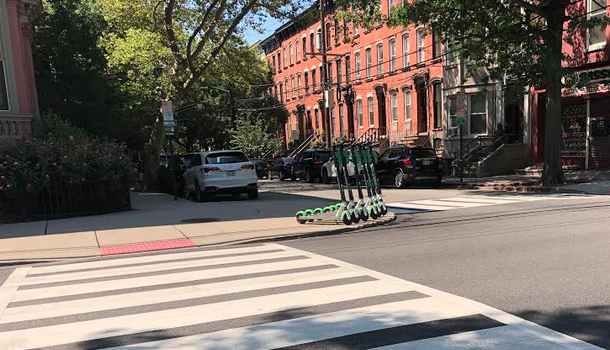
WHO WANTS TO ROLL?: Hoboken Initiates Outreach to Scooter and Micromobility Companies
Hoboken’s rather bumpy scooter rideshare pilot program ended November 20, but the conversation on micromobility in the Mile Square City rolls on. Today Hoboken announced that it would be entertaining options from other potential partners following the six-month e-scooter rideshare trial with Lime.
“The City of Hoboken’s Transportation Department has released a request for information (RFI) from micromobility companies,” reads a statement released this afternoon. “The RFI process will provide the City current practices of micromobility companies, to help inform the future of shared mobility in Hoboken. Operators of shared mobility, including bicycles, electric scooters, electric bicycles, and car share are encouraged to reply to the questions within the RFI.”

Scooters in Hoboken came under immediate and intense scrutiny following their rollout on May 20. With over 1,000 calls to Hoboken PD within the first 24 hours, a rider was arrested a month later for attempting to flee police on the Waterfront after colliding with a pedestrian. In September, a scooter collided with a mother and child on the sidewalk, prompting Hoboken City Council to crackdown on safety with bans in parks and on the Waterfront. Meanwhile, incidents of DWI on scooters in Hoboken made headlines regionwide.
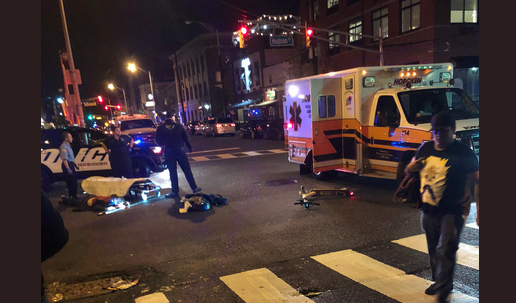
Hoboken Scooter Rider Hospitalized After Collision With Vehicle On 14th & Hudson—image by @scoot_so
Nevertheless, the City of Hoboken had made a concerted effort to make it appear that scooters were here to stay. When the program became a revenue stream for the City in August—with a portion of each ride allegedly earmarked for enforcement, infrastructure and education initiatives—many saw that as a sign that Lime was more than just the flavor of the month. Nevertheless, questions about the enforcement end of things still lingered, prompting the City to announce the hiring of mission-specific micromobility enforcement officers. Even with that move, the skepticism remained—in the face of volumes of anecdotal and documented concerns over safety.
On the very day that Hoboken ended its program with Lime, a 16 year-old boy in nearby Elizabeth, New Jersey was struck and killed while riding a scooter, more than underscoring those concerns.

Days later, the City of Hoboken released the results of its own shared electric scooter end-of-pilot survey. Approximately 2,100 people participated in the survey between October 23 and November 10, 2019—93% were Hoboken residents, and 66% stated they had ridden a scooter at least once during the 6-month pilot program.
According to the results of the survey, 48.5% of respondents wanted to see the program return as is. Another 26% wanted to see it come back, but with improvements to the program. Meanwhile 25% disagreed with the notion that an e-scooter sharing program should continue in Hoboken.
Of those who responded to the public survey, 44% said they had used e-scooters at least 10 times during the pilot, while 33% said they had never used an e-scooter during the pilot. Consensus seems to be that the scooters made it easy to get around (64%), while 68% said that they agreed or strongly agreed that e-scooters should be better regulated. As for improvements, 44% of all respondents said that they would like to see safer infrastructure in a future e-scooter program, which was the most popular response after increased enforcement and resident discounts when prompted on potential changes.
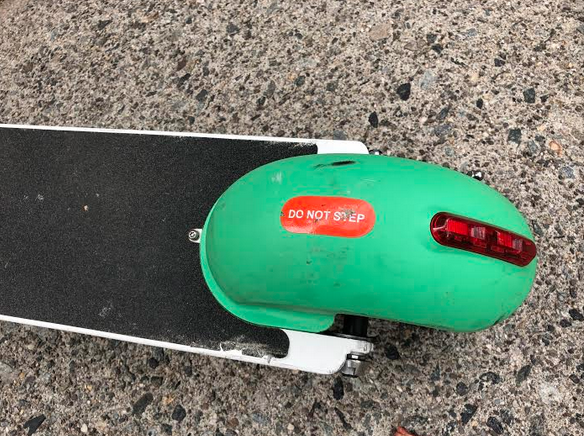
Getting laws on the books and developing pragmatic solutions for enforcement have proven to be of significant concern. While some residents have been clamoring for a knee-jerk ban on scooters and their ilk, the reality is that micromobilty won’t go away. Electric scooters currently retail for $159—which means removing the scooter program would simply result in taking these things out of the hands of vendors who can theoretically be held accountable.
In November, Hoboken Councilwoman Tiffanie Fisher noted that requirements of future programs, “may include things like geo-fencing certain areas and one-way streets, having corrals instead of just leaving anywhere, a system that would put more financial burden on eScooter companies to enforce given our own lack of enforcement resources, and addressing insurance and liability concerns.” Fisher added, “the bar will be very high and will have to be met before this comes back to the Council for a vote.”
It’s worth noting that Hoboken has in no way ruled out Lime’s return. The City is simply exploring its options in the wake of the initial six-month trial.
In an op-ed for hMAG.com back in July, it was noted that, “It will take thoughtful, pragmatic urban planning and inventive strategies for effective enforcement. It will take a coalition of stakeholders—residents, politicians, vendors, law enforcement—prepared to remain focused on a common goal.”
As for Hoboken’s next micromobility experiment, all submissions must be received by the City of Hoboken no later than 12:00 pm on January 23, 2020. Interested parties are invited to contact Gregory Francese at gfrancese@hobokennj.gov.
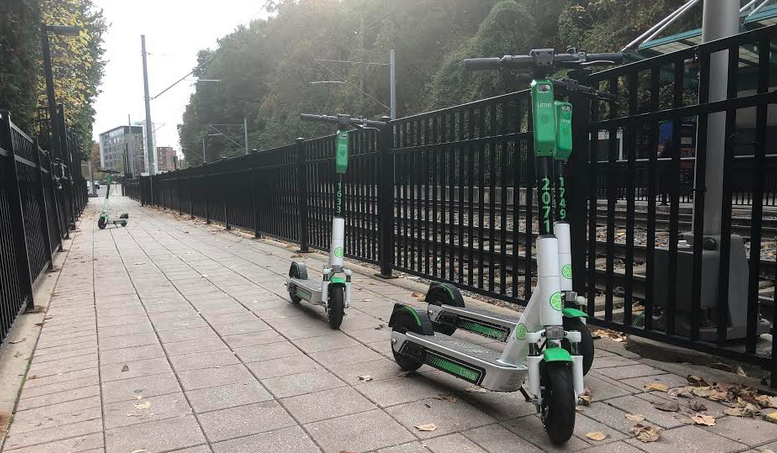
***

 Previous Article
Previous Article Next Article
Next Article INTIMATE DETAILS EXPOSED: Rebecca Ferrier Photography on the Bare Facts of Boudoir Photos
INTIMATE DETAILS EXPOSED: Rebecca Ferrier Photography on the Bare Facts of Boudoir Photos  UGLY, EVEN FOR HOBOKEN: Six Months Since Forged Xenophobic Fliers Put Mile Square Politics Under Worldwide Scrutiny
UGLY, EVEN FOR HOBOKEN: Six Months Since Forged Xenophobic Fliers Put Mile Square Politics Under Worldwide Scrutiny  DOUBLE-DOWN: Substantial Fiscal Woes Come to Light in Hoboken
DOUBLE-DOWN: Substantial Fiscal Woes Come to Light in Hoboken  BRIDGE OVER TROUBLED WATER MAINS: Hoboken and SUEZ Announce Formation of Public Water Utility, New Service Contract
BRIDGE OVER TROUBLED WATER MAINS: Hoboken and SUEZ Announce Formation of Public Water Utility, New Service Contract  IT MUST BE THE BAGELS: New Yorkers Keep Lining Up to Move to New Jersey
IT MUST BE THE BAGELS: New Yorkers Keep Lining Up to Move to New Jersey  Play Ball: Sports In The Mile Square
Play Ball: Sports In The Mile Square 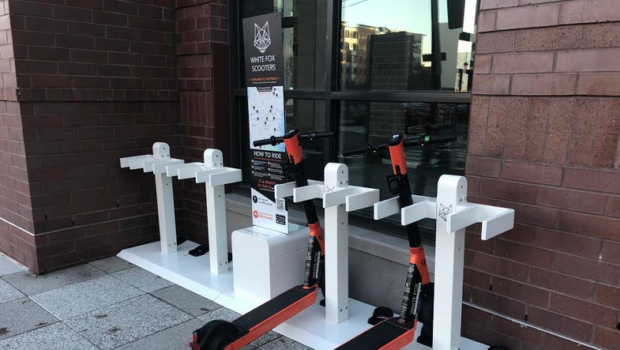 THEY’RE BACK: White Fox Spotted Scooting Around Hoboken
THEY’RE BACK: White Fox Spotted Scooting Around Hoboken  HO-BAKIN’, NJ—A Hard-Crusted Town With a Soft, Warm Center
HO-BAKIN’, NJ—A Hard-Crusted Town With a Soft, Warm Center